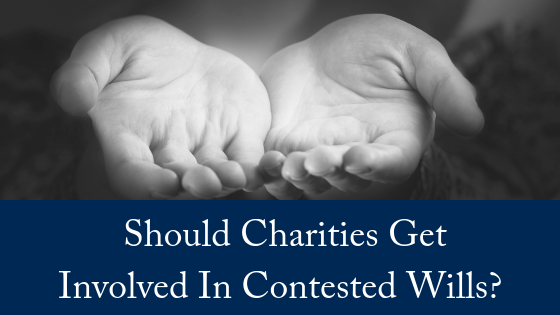It seems like a common decision to make: leave some (or all) of your money to the charities of your choice in your will. Of course, sometimes your family members don’t quite agree – they may think they deserve the money and decide to contest your will. Should the charities get involved in contested wills as they play out in court?
When Sybil Jenazian died, it was no surprise to her family that her estate was worth a tidy sum. Her Armenian father had made a fortune in the Lancashire cotton trade and left most of it to Sybil. But soon after her death her family were shocked to find that Sybil had changed her will in 2012, leaving the bulk of the money – believed to be more than £1m – to a local £11,000-a-year private school.
In the UK, the number of inheritance disputes brought to the high court has jumped eight-fold in 10 years, with many more ending up in the county court. Warring parties typically claim there was “undue influence” placed on the deceased when he or she wrote a will, or that they did not have the right “mental capacity” at the time. In one case in 2012 involving sibling rivalry over a dead mother’s estate, the judge warned that the legal costs would take every penny of the £120,000 inheritance.
Others make claims under the Inheritance Act 1975, arguing that close family members have not been given reasonable financial provision.
Recently, the supreme court heard a 10-year legal battle where Heather Ilott from Hertfordshire argued that her mother was wrong to leave £486,000 in her estate to animal charities Blue Cross, the RSPCA and the RSPB. Initially a lower court ruled that Ilott, who had from the age of 17 been estranged from her mother Melita Jackson, should be awarded £50,000 on the grounds that her mother had acted in an “unreasonable, capricious and harsh” way towards her.
Ilott thought she should be awarded more, and in 2011 the court of appeal increased it to £143,000 for a house purchase, plus £20,000 for living costs. It was this ruling that spurred many others to challenge what they see to be unfair wills. However, the supreme court overruled that decision – dropping the award back down to £50,000.
Solicitors in the UK declared that the ruling reaffirms the “testamentary freedom” of wills in England. In other words, so long as the will is correctly drawn up, signed and witnessed, there is virtually nothing to stop an individual leaving everything to a cats’ home should they wish.
“Sybil was a friend of mine [but] her old school influenced her to change her will in her 80th year to leave them nearly her entire estate.” She says that a will in 2000 left all Sybil’s money to her family, but then in 2007 it was changed to add a small sum to the school, then in 2012 it was changed again to leave the vast majority of the estate to the school.
Booth complained firstly to the school, then the Fundraising Standards Board (now called the Fundraising Regulator), and then the Charity Commission for England and Wales, but says she hit a brick wall.
Why, she asks, would Sybil leave so much to a rich private school? “I think of a charity as helping sick or poor people. I don’t understand how a private school can be a charity.”
The school vigorously denies Booth’s claims. In a statement, headmistress Claire Hewitt said: “Sybil Jenazian attended our school during the 1940s and returned for a reunion event in 2007. From this point, for almost 10 years until her death, she was a familiar face at school events such as drama productions and concerts.”
These charities might feel like celebrating, but at what cost?
The Guardian reports that levels of public trust in charities have fallen steadily in recent years, driven downward by scandals about fundraising behaviour and so-called “fat cat” pay. The public is worried that voluntary organisations have lost sight of their core values. One major piece of analysis found recurring frustration at how far charities were willing to go to raise money.
Contested Wills in Queensland
In each of the states of Australia, the law casts an obligation upon a will maker to make adequate provision for certain persons. The definition of ‘certain persons’ differs from state to state. In Queensland, a will maker ought to make adequate provision for the following persons:
- Spouse;
- Former spouse (in limited circumstances);
- Child;
- Step-child;
- A dependent (in limited circumstances).
It is at the discretion of the court as to whether or not family provision claims are successful. Not every applicant will be successful and not every applicant is eligible. The key is to seek advice from an expert in succession law.
The important thing to remember with family provision claims is that the test is not to establish what the deceased intended under the will. The court must simply decide whether or not provision ought to be made to the applicant based on a number of things:
- Whether any provision you have already received is adequate for your proper maintenance, education and advancement in life.
- Competing claims of other eligible persons or beneficiaries. You may not be the only person who was cut out of the will.
- The nature and duration of your relationship with the person who has passed away.
- Your financial resources and earning capacity.
- The size of the estate. For example, you may pass all the criteria to make a successful family provision claim, but if there is only $20,000.00 in the estate, then there is very little scope for a Court to order provision.
- The financial circumstances of people you cohabit with, such as your spouse or de facto.
- Contributions you made, both financial and non-financial, to the person who has passed away.
- Any provision the deceased person made for you during their lifetime.
The area of law surrounding family provision claims is complex. Advice should always be sought urgently as there are tight time frames. In Queensland, you only have 9 months from the date of death and notification must be made within 6 months from date of death.
For expert advice, contact our friendly team today. We offer a FREE, 10-minute phone consultation.


 Janice Booth has been fighting Manchester High School for Girls over Jenazian’s legacy on behalf of the late woman’s cousins, who were previously named as the chief beneficiaries. She says she feels deeply let down by the law, as well as the institutions that regulate charities and fundraising.
Janice Booth has been fighting Manchester High School for Girls over Jenazian’s legacy on behalf of the late woman’s cousins, who were previously named as the chief beneficiaries. She says she feels deeply let down by the law, as well as the institutions that regulate charities and fundraising.